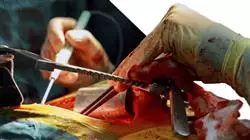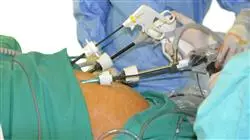University certificate
The world's largest faculty of medicine”
Introduction to the Program
This program integrates the most advanced knowledge in Clinical Hepatology and gastroenterology, and will allow you to delve into the latest developments in the cardiomyopathy of the cirrhotic"

The increasing complexity of hepatology and gastroenterology has brought with it a great advance in diagnostic methods, treatments and surgical interventions in these fields. Thus, these disciplines have now integrated numerous highly effective solutions for pathologies that are difficult to treat, making it necessary for specialists to update their knowledge immediately.
For this reason, this program has been designed to incorporate all the innovations in this medical area, providing the professional with a complete update. Thus, throughout this Advanced master’s degree, it will be possible to learn about the latest developments in issues such as risk factors and screening for hepatocellular carcinoma, clinical manifestations and prognostic models of liver cirrhosis, non-cirrhotic portal hypertension or the role of the gastrointestinal tract in pediatric oncohematology.
All of this is based on an online learning system especially designed for working professionals, as it will adapt to the personal circumstances of the doctor, allowing them to study when and where they wish, without rigid schedules or uncomfortable travel. It will also have the latest content presented through different multimedia formats and will receive the support and guidance of a teaching staff made up of leading experts in these disciplines.
You will enjoy the best multimedia resources to get you up to speed quickly: video procedures, case studies, interactive summaries..."
This Advanced master’s degree in Clinical Hepatology contains the most complete and up-to-date scientific program on the market. The most important features include:
- The development of case studies presented by experts in medicine
- The graphic, schematic, and eminently practical contents with which they are created, provide scientific and practical information on the disciplines that are essential for professional practice
- Practical exercises where the self-assessment process can be carried out to improve learning
- Its special emphasis on innovative methodologies in hepatology and gastroenterology
- Theoretical lessons, questions to the expert, debate forums on controversial topics, and individual reflection assignments
- Access to content from any fixed or portable device with an Internet connection
Update your knowledge in hepatology in a quick and easy way thanks to the online methodology this Advanced master’s degree, which will allow you to combine your studies with your work without being subject to rigid schedules"
Its teaching staff includes professionals belonging to the field of medicine, who bring to this program the experience of their work, in addition to recognized specialists from prestigious reference societies and universities.
This program is designed around Problem-Based Learning, whereby the student must try to solve the different professional practical situations that arise during the academic year. For this purpose, the professional will be assisted by an innovative interactive video system created by renowned and experienced experts
Learn, thanks to this program, the latest developments in acute and chronic rejection in liver transplantation"

A teaching staff of great prestige in the field of hepatology will accompany you throughout the learning process"
Why study at TECH?
TECH is the world’s largest online university. With an impressive catalog of more than 14,000 university programs available in 11 languages, it is positioned as a leader in employability, with a 99% job placement rate. In addition, it relies on an enormous faculty of more than 6,000 professors of the highest international renown.

Study at the world's largest online university and guarantee your professional success. The future starts at TECH”
The world’s best online university according to FORBES
The prestigious Forbes magazine, specialized in business and finance, has highlighted TECH as “the world's best online university” This is what they have recently stated in an article in their digital edition in which they echo the success story of this institution, “thanks to the academic offer it provides, the selection of its teaching staff, and an innovative learning method aimed at educating the professionals of the future”
A revolutionary study method, a cutting-edge faculty and a practical focus: the key to TECH's success.
The most complete study plans on the university scene
TECH offers the most complete study plans on the university scene, with syllabuses that cover fundamental concepts and, at the same time, the main scientific advances in their specific scientific areas. In addition, these programs are continuously being updated to guarantee students the academic vanguard and the most in-demand professional skills. In this way, the university's qualifications provide its graduates with a significant advantage to propel their careers to success.
TECH offers the most comprehensive and intensive study plans on the current university scene.
A world-class teaching staff
TECH's teaching staff is made up of more than 6,000 professors with the highest international recognition. Professors, researchers and top executives of multinational companies, including Isaiah Covington, performance coach of the Boston Celtics; Magda Romanska, principal investigator at Harvard MetaLAB; Ignacio Wistumba, chairman of the department of translational molecular pathology at MD Anderson Cancer Center; and D.W. Pine, creative director of TIME magazine, among others.
Internationally renowned experts, specialized in different branches of Health, Technology, Communication and Business, form part of the TECH faculty.
A unique learning method
TECH is the first university to use Relearning in all its programs. It is the best online learning methodology, accredited with international teaching quality certifications, provided by prestigious educational agencies. In addition, this disruptive educational model is complemented with the “Case Method”, thereby setting up a unique online teaching strategy. Innovative teaching resources are also implemented, including detailed videos, infographics and interactive summaries.
TECH combines Relearning and the Case Method in all its university programs to guarantee excellent theoretical and practical learning, studying whenever and wherever you want.
The world's largest online university
TECH is the world’s largest online university. We are the largest educational institution, with the best and widest online educational catalog, one hundred percent online and covering the vast majority of areas of knowledge. We offer a large selection of our own degrees and accredited online undergraduate and postgraduate degrees. In total, more than 14,000 university degrees, in eleven different languages, make us the largest educational largest in the world.
TECH has the world's most extensive catalog of academic and official programs, available in more than 11 languages.
Google Premier Partner
The American technology giant has awarded TECH the Google Google Premier Partner badge. This award, which is only available to 3% of the world's companies, highlights the efficient, flexible and tailored experience that this university provides to students. The recognition as a Google Premier Partner not only accredits the maximum rigor, performance and investment in TECH's digital infrastructures, but also places this university as one of the world's leading technology companies.
Google has positioned TECH in the top 3% of the world's most important technology companies by awarding it its Google Premier Partner badge.
The official online university of the NBA
TECH is the official online university of the NBA. Thanks to our agreement with the biggest league in basketball, we offer our students exclusive university programs, as well as a wide variety of educational resources focused on the business of the league and other areas of the sports industry. Each program is made up of a uniquely designed syllabus and features exceptional guest hosts: professionals with a distinguished sports background who will offer their expertise on the most relevant topics.
TECH has been selected by the NBA, the world's top basketball league, as its official online university.
The top-rated university by its students
Students have positioned TECH as the world's top-rated university on the main review websites, with a highest rating of 4.9 out of 5, obtained from more than 1,000 reviews. These results consolidate TECH as the benchmark university institution at an international level, reflecting the excellence and positive impact of its educational model.” reflecting the excellence and positive impact of its educational model.”
TECH is the world’s top-rated university by its students.
Leaders in employability
TECH has managed to become the leading university in employability. 99% of its students obtain jobs in the academic field they have studied, within one year of completing any of the university's programs. A similar number achieve immediate career enhancement. All this thanks to a study methodology that bases its effectiveness on the acquisition of practical skills, which are absolutely necessary for professional development.
99% of TECH graduates find a job within a year of completing their studies.
Professional Master's Degree in Clinical Hepatology
To adequately diagnose and treat pathologies such as hepatitis and gastroenteritis, not only the advancement of hepatological intervention techniques and technologies is needed, but also the high qualification of specialists. For this reason, at TECH Global University we have developed the Professional Master's Degree in Clinical Hepatology, a program through which you will obtain an advanced level of training in areas such as epigenetics, liver transplants and the management of viral hepatitis, among other aspects. If you are interested in the approach to these complex diseases, as well as the many solutions that have been successfully integrated in recent years, our postgraduate degree is for you.
Specialize in Clinical Hepatology
At TECH Global University you will have the opportunity to specialize through an excellent scientific program. With the most advanced technological and human resources, you will acquire new skills that will give you the ability to intervene in the area of hepatology. Also, thanks to the theoretical and practical learning that involves the study of real clinical cases, you will recognize the indications, contraindications, rationale and limitations of diagnostic and therapeutic methods for liver diseases; you will apply curative treatments according to the patient's condition, acute or chronic, and you will integrate the latest advances in your interventions in order to ensure an accurate prognosis and a rapid recovery. With our Advanced Master's Degree you will achieve to excel in the practice of this discipline and revalue your professional profile.







